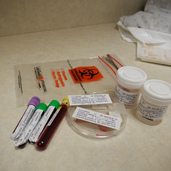
Ms. Pratten is a Canadian woman who was conceived through the use of donor sperm in the early 1980s. Ms. Pratten sued the Province of British Columbia (and others) for, among other things, discriminating against donor-conceived people as compared to adult adoptees by failing to take steps to ensure that identifying and medical information about the donor was available to donor-conceived people upon reaching the age of majority. Ms. Pratten alleged that donor-conceived people suffered from various traumas as a result of not having access to such information, and this allegation was accepted by the lower court. Ms. Pratten was successful in the lower court, but the decision was overturned by the B.C. Court of Appeal. For more information about the decisions, read this article here.
The fertility community - including parents, donor-conceived people, clinics, sperm banks, doctors, and lawyers - was waiting with baited breath for this decision. Although the case was originally brought in B.C., if successful, it was widely believed that the implication would be a national ban on the use of anonymously donated sperm and eggs across Canada. This would be the case for all donor sperm and eggs, despite the lack of known or open identification donors among various ethnic groups, the parents' preference, etc.
At this point in time, of all the donor sperm used in Canada that is not from a known donor (for the most part, such sperm being imported into Canada from the U.S. and Europe), about 60% is from open identity (open-i.d.) donors, meaning upon reaching the age of majority, the child already has access to information about the donor through the sperm bank (notably, though, this is a contractual relationship and the information provided is not through the state, province or territory). The specifics of what information is available to the donor-conceived person varies from sperm bank to sperm bank. The only remaining national Canadian sperm bank, Repromed, also offers donors and parents open-i.d. as an option. Over the past decade or so, there has been a definite increase in Canadian parents' preference to use known or open-i.d. donors as compared to anonymous donors. However, this preference isn't necessarily true for everyone, and isn't necessarily true of parents from every community. For example, some fascinating research has been published about the British South Asian community which seems to suggest that this community is one that would struggle with the idea of known gamete donation.
Is it acceptable that parents have a choice in deciding what is in the best interests of their child, taking into account many different factors, including the culture in which the family exists? Is it enough that through education and research, without imposing a complete ban, far more Canadian parents are choosing known or open-identity donors than are choosing anonymous donors?
In my opinion, the best way to encourage known gamete donation across Canada is not to impose a ban on anonymity (which clearly isn't legally sound as per the B.C. Court of Appeal's decision), but for each province to draft legislation which clearly sets out the rights and obligations of sperm and egg donors, parents and children conceived through gamete donation, with respect to parental rights. If parents were less concerned that a donor may have parental or other rights to their child, it seems logical that they would be less concerned about the issue of anonymity.



 RSS Feed
RSS Feed